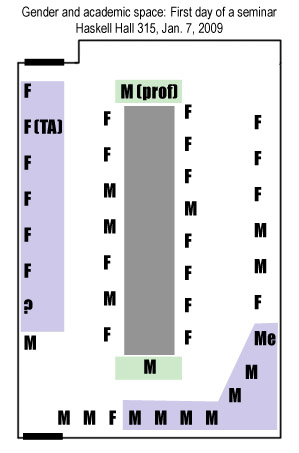Here is a diagram of how students arranged themselves around the room, on the first day of a seminar that happened to be on space and place. It reveals an obviously gendered system of spontaneous spatial organization.

critical anthropology of academic culture
Here is a diagram of how students arranged themselves around the room, on the first day of a seminar that happened to be on space and place. It reveals an obviously gendered system of spontaneous spatial organization.

This is going to be crude and quantitative, but I want to give a bit of concrete evidence bearing on a trend that, I suppose, must already be subjectively apparent to everyone who pays attention to gender in academic life: the tendency for males to speak first, or in particular, to be the first to volunteer comments in large public discussions. This obviously isn’t the case always and everywhere, and must be shaped by a large number of variables: group size, topic, distribution of interest and topical expertise, social rank and authority, and degree of acquaintanceship or shared social belonging, to name a few. For instance, I don’t notice this trend when the anthropology faculty, who are colleagues well known to each other, are responding to guest speakers at the weekly department seminar. But I did notice this trend very strongly at a public lecture by Bernie Sanders in December, where about the first ten speakers were all male, while only a very few women got to comment at all, and they were towards the very end of the line.
But to avoid making claims based purely on the hazardous results of personal experience, let me report the following.